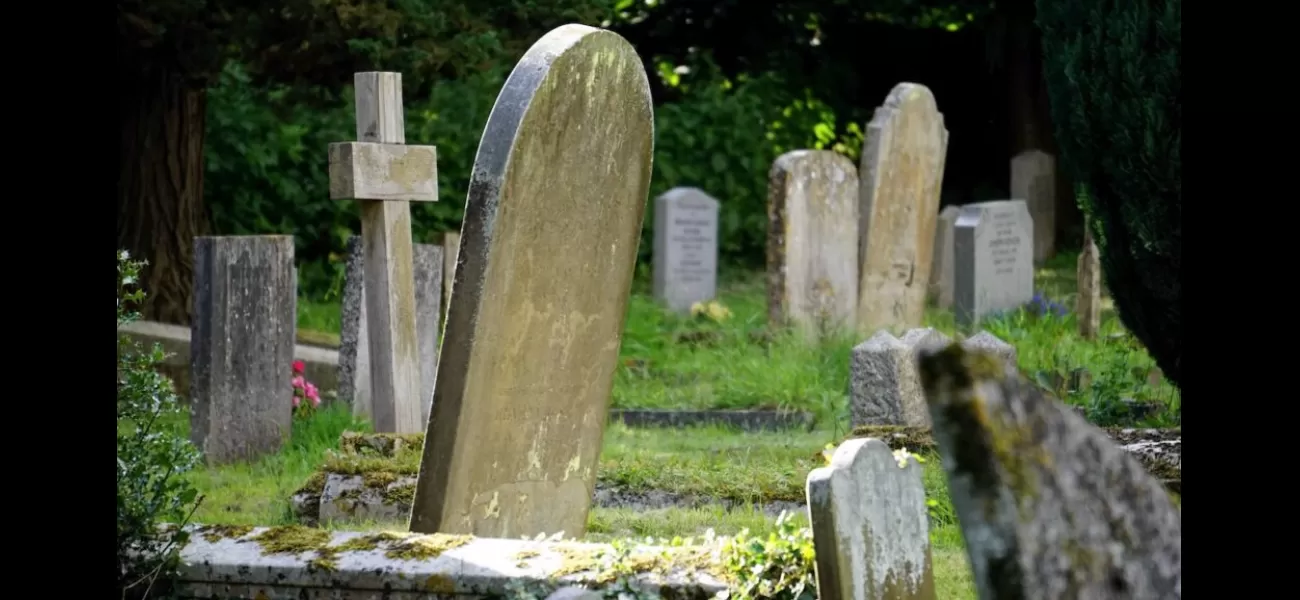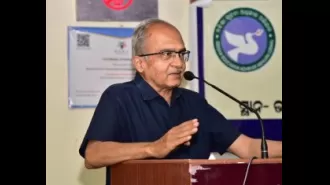Neglected slave graveyards gaining increased recognition across the country.
Director Renata Lisowski says many cemeteries where Black people were buried have been lost due to urban development, highlighting a growing awareness of these forgotten burial grounds.
February 11th 2024.

More and more people are beginning to take notice of the burial grounds of enslaved people. It's a topic that has long been overlooked, but thanks to the efforts of individuals like Rachel Peric and Nadine Chapman, the history of these sites is finally getting the recognition it deserves.
It all started when Peric and Chapman stumbled upon a plantation gravesite in Montgomery County, Maryland. It was a site that had been largely ignored by the county, but the duo was determined to shed light on its significance. They began working with the Chevy Chase Historical Society, which resulted in a series of lectures highlighting the history of the Chevy Chase area. The first lecture focused on the Rollingwood Burial Ground for Enslaved People, which was the very site that Peric and Chapman had rediscovered.
Renata Lisowski, the director of the society's Archive and Research Center, explained to NPR that many cemeteries, especially those where Black people were buried, have been displaced or erased due to urban development. She also pointed out that there are still many unknowns surrounding these sites, such as the identities of those who were buried there, as names were often not recorded for enslaved individuals in the census.
Peric and Chapman are just a few of the many individuals who are working to bring attention to the grave sites of formerly enslaved African Americans. One such person is Pastor Michelle Thomas, who tragically lost her 16-year-old son Fitz in a drowning accident. She chose to lay him to rest in the Slave Cemetery located on the Belmont Plantation, a site she had been fighting to restore. Thomas shared with NPR, "My son is the first African American person who was born free to be buried in this cemetery. He brings the message of freedom to the ancestors that eventually, we made it to the other side."
Antoinette Jackson, a professor and chair of the Department of Anthropology at the University of South Florida, also recognized the need to preserve and honor these forgotten cemeteries. She created the African American Burial Ground and Remembering Project in 2020, which focused on cemeteries in the Tampa Bay area. Jackson's project led to the creation of the Black Cemetery Network, which has mapped out over 140 burial sites across the country.
Jackson explained to NPR that many of these cemeteries have been buried under modern developments, such as office buildings and housing complexes. She also pointed out that the lack of protection for Black cemeteries is a direct result of the impact of slavery on the ability of Black communities to sustain their burial practices and sacred sites.
But things are slowly changing, thanks to the efforts of people who are taking notice of their own communities. Jackson shared, "People are looking around where they live and go, 'Wait a minute, I see that.' And they start to research their own communities, looking at historical records, maps, and land deeds."
As for Peric and Chapman, their hard work will soon pay off. After selecting a park in the neighborhood and receiving approval from the county, the duo is working with the Maryland-National Capital Park and Planning Commission to create signage that will honor the individuals buried in the Rollingwood cemetery. The Rollingwood Burial Ground for Enslaved People will no longer be a forgotten and buried part of history, but a place where the people who were laid to rest there will be forever remembered.
In a related story, the Penn Museum has recently reinterred 19 Black Philadelphians who had been held in its storeroom for over two centuries. This is another example of the growing attention being given to forgotten burial grounds of enslaved people across the country. The importance of preserving and honoring these sites cannot be overstated, as they are a crucial part of our nation's history and deserve to be recognized and remembered.
It all started when Peric and Chapman stumbled upon a plantation gravesite in Montgomery County, Maryland. It was a site that had been largely ignored by the county, but the duo was determined to shed light on its significance. They began working with the Chevy Chase Historical Society, which resulted in a series of lectures highlighting the history of the Chevy Chase area. The first lecture focused on the Rollingwood Burial Ground for Enslaved People, which was the very site that Peric and Chapman had rediscovered.
Renata Lisowski, the director of the society's Archive and Research Center, explained to NPR that many cemeteries, especially those where Black people were buried, have been displaced or erased due to urban development. She also pointed out that there are still many unknowns surrounding these sites, such as the identities of those who were buried there, as names were often not recorded for enslaved individuals in the census.
Peric and Chapman are just a few of the many individuals who are working to bring attention to the grave sites of formerly enslaved African Americans. One such person is Pastor Michelle Thomas, who tragically lost her 16-year-old son Fitz in a drowning accident. She chose to lay him to rest in the Slave Cemetery located on the Belmont Plantation, a site she had been fighting to restore. Thomas shared with NPR, "My son is the first African American person who was born free to be buried in this cemetery. He brings the message of freedom to the ancestors that eventually, we made it to the other side."
Antoinette Jackson, a professor and chair of the Department of Anthropology at the University of South Florida, also recognized the need to preserve and honor these forgotten cemeteries. She created the African American Burial Ground and Remembering Project in 2020, which focused on cemeteries in the Tampa Bay area. Jackson's project led to the creation of the Black Cemetery Network, which has mapped out over 140 burial sites across the country.
Jackson explained to NPR that many of these cemeteries have been buried under modern developments, such as office buildings and housing complexes. She also pointed out that the lack of protection for Black cemeteries is a direct result of the impact of slavery on the ability of Black communities to sustain their burial practices and sacred sites.
But things are slowly changing, thanks to the efforts of people who are taking notice of their own communities. Jackson shared, "People are looking around where they live and go, 'Wait a minute, I see that.' And they start to research their own communities, looking at historical records, maps, and land deeds."
As for Peric and Chapman, their hard work will soon pay off. After selecting a park in the neighborhood and receiving approval from the county, the duo is working with the Maryland-National Capital Park and Planning Commission to create signage that will honor the individuals buried in the Rollingwood cemetery. The Rollingwood Burial Ground for Enslaved People will no longer be a forgotten and buried part of history, but a place where the people who were laid to rest there will be forever remembered.
In a related story, the Penn Museum has recently reinterred 19 Black Philadelphians who had been held in its storeroom for over two centuries. This is another example of the growing attention being given to forgotten burial grounds of enslaved people across the country. The importance of preserving and honoring these sites cannot be overstated, as they are a crucial part of our nation's history and deserve to be recognized and remembered.
[This article has been trending online recently and has been generated with AI. Your feed is customized.]
[Generative AI is experimental.]
0
0
Submit Comment





